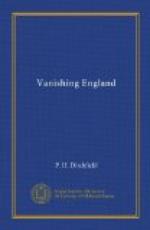The three great events of human life—birth, marriage, and death—have naturally drawn around them some of the most curious beliefs. These are too numerous to be recorded here, and I must again refer the curious reader to my book on old-time customs. We should like to dwell upon the most remarkable of the customs that prevail in the City of London, in the halls of the Livery Companies, as well as in some of the ancient boroughs of England, but this record would require too large a space. Bell-ringing customs attract attention. The curfew-bell still rings in many towers; the harvest-bell, the gleaning-bell, the pancake-bell, the “spur-peal,” the eight-hours’ bell, and sundry others send out their pleasing notice to the world. At Aldermaston land is let by means of a lighted candle. A pin is placed through the candle, and the last bid that is made before that pin drops out is the occupier of the land for a year. The Church Acre at Chedzoy is let in a similar manner, and also at Todworth, Warton, and other places. Wiping the shoes of those who visit a market for the first time is practised at Brixham, and after that little ceremony they have to “pay their footing.” At St. Ives raffling for Bibles continues, according to the will of Dr. Wilde in 1675, and in church twelve children cast dice for six Bibles. Court, Bar, and Parliament have each their peculiar customs which it would be interesting to note, if space permitted; and we should like to record the curious bequests, doles, and charities which display the eccentricities of human nature and the strange tenures of land which have now fallen into disuse.
It is to be hoped that those who are in a position to preserve any existing custom in their own neighbourhood will do their utmost to prevent its decay. Popular customs are a heritage which has been bequeathed to us from a remote past, and it is our duty to hand down that heritage to future generations of English folk.
CHAPTER XIX
THE VANISHING OF ENGLISH SCENERY AND NATURAL BEAUTY
Not the least distressing of the losses which we have to mourn is the damage that has been done to the beauty of our English landscapes and the destruction of many scenes of sylvan loveliness. The population of our large towns continues to increase owing to the insensate folly that causes the rural exodus. People imagine that the streets of towns are paved with gold, and forsake the green fields for a crowded slum, and after many vicissitudes and much hardship wish themselves back again in their once despised village home. I was lecturing to a crowd of East End Londoners at Toynbee Hall on village life in ancient and modern times, and showed them views of the old village street, the cottages, manor-houses, water-mills, and all the charms of rural England, and after the lecture I talked with many of the men who remembered their country homes which they had left in the days




